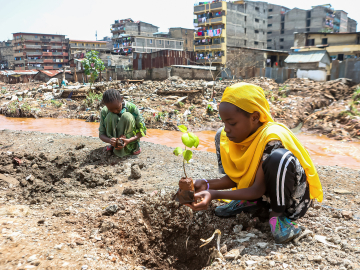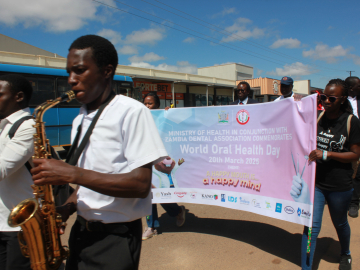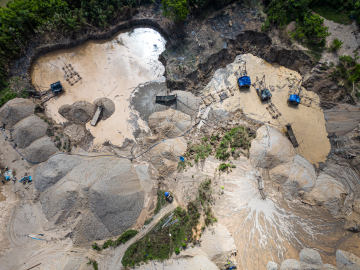America's Bubble: Q&A with Lise Van Susteren, Part II
Psychiatrist Lise Van Susteren specializes in the psychological effects of climate change—and believes that mental health professionals—by the nature of their training—are uniquely positioned to reach people and bring about change. Van Susteren is part of the Climate Psychology Alliance, an international group working to inform professionals and the public of the profound impacts of climate disruption on mental health and well-being, meeting this week in the UK. She also serves on the Advisory Board of the Center for Health and the Global Environment at the Harvard T.H. Chan School of Public Health, and the Earth Day Network National Wildlife Federation board. GHN’s Dayna Kerecman Myers reached out to Van Susteren after she presented about the effect of climate change on mental health at last month’s Climate & Health Meeting in Atlanta, Georgia.
Why do you think Americans are so much more reluctant than the rest of the world to accept the reality of climate change?
We live in a bubble. We’re relatively safe. People who live in Europe, Africa, other places have endured wars, or shortages—we live a very isolated, protected life here. It’s like the rich kid whose bike is stolen, and he goes and gets another one. We are not conservative in the sense that we recognize how much we stand to lose. I once read that in general, the older the nation, the more altruistic it tends to become. This is certainly true of us as individuals. In Europe, perhaps driven by the fear of shortages, high consumption from a social norm perspective is more likely to be frowned upon than it is here in the US. But I also know one thing: We are about 5% of the population and we put up about 25% of the greenhouse gases. In some places, where America is hated, our role in destabilizing the climate because of a carbon-intensive lifestyle has become a rallying cry against us. As the world is increasingly becoming aware – I worry – will we become pariahs?
The sorry thing is that we have had the keys for so much of the transformational technology. Knowing that you best lead by example, quickly transitioning to clean, renewable energy in the US, and sharing the technology so that others can also stay safe, healthy and secure, is the approach that will make the world safe for democracy. Building walls, fueling ethno-centric division, and building up the military will not … and our denial is going to be looked upon as an unforgivable assault on the rest of the world.
Do you have any thoughts on how to recast the climate change narrative in America, in a way that could de-politicize the issue, or are we too far gone?
There is an important formula—a medical model—that applies here. When you tell a patient that he or she is very sick, to get them to undergo the treatment—surgery, chemo—you’ve got to convince them that the treatment is worth the trouble. You have to tell people the truth, that we’re headed for the cliff, to shake them out of their inertia. Then, after you let them know how perilous our state is, you must tell them how to change the trajectory. Get them ruffled, get them listening—then present solutions: transition to clean energy, buy sustainable goods, vote for candidates who prioritize climate policy, etc.
What messaging do you think is most effective for the “unconverted,”—people inclined to turn to “what they perceive as strong leaders,” to protect them?
Fear—of climate change, terrorism, refugees—whom we fear are members of ISIS —causes people to regress. That drives them to seek security from leaders who promise them safety—and who often be self-aggrandizing bullies only exploiting their fears to gain power.They will promise protection, and we’ll quickly give up our freedom and values for the perception of safety. But in any effort to reach people, you have to understand who they are—their words, phrases, and goals. For example, In my home state of Wisconsin where people love to go ice fishing, you will point out the lakes aren’t freezing over like they had in the past. Skiers—no snow; farmers—water shortages; coastal dwellers—sea level rise, etc. If you’re talking to people who are skeptical because of religious reasons, it’s wise to talk about stewardship. Using words that reflect where your audience is mentally, physically is a critical way to reach them. And that is how psychiatrists break down individual denial and resistance. Upstream, the Climate Psychiatry Alliance focuses on the organizational level, calling for training, curricula changes, applying to present at meetings, publishing position papers, etc.
You have also mentioned the need for data that will connect emotionally, and emphasized that action turns on our success in stirring empathy. What kind of studies would you urge public health researchers to undertake?
For me it isn’t needing more data, although that is of course important. For me right now, the critical goal is to get what we already know to the ears of everyone we know, and to turn that into action—supporting candidates who are making climate change a priority, running for office, etc. It’s transitioning in our personal lives to clean renewable energy and leading by example—taking public transportation, not flying anywhere at the drop of a hat, but getting on Amtrak instead. It is the sum of all the choices we are making in full consciousness that is so much more powerful now—it drives the market, it influences people around us, and it primes us for the path that we all need to take. While I’m deeply respectful of data, the minor differences in, for example sea level rise, don’t matter to average people; we need to offer solutions relevant to their lives, not more data.
On messaging, I struggle with people who say don’t depress people—reassure them they can have green grass, blue skies, clear water. But as Bob Cialdini said, people aren’t motivated by what they stand to gain, but what they stand to lose. We’re loss averse. We need to offer data, but also tell people here’s what we stand to lose—and here’s what we can do to prevent that loss.
Join the thousands of subscribers who rely on Global Health NOW summaries and exclusive articles for the latest public health news. Sign up for our free weekday enewsletter, and please share the link with friends and colleagues: Subscribe to GHN




